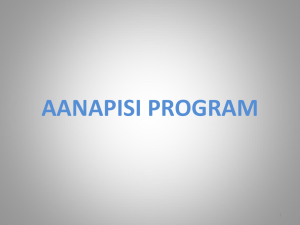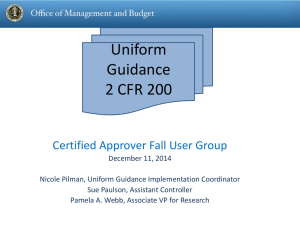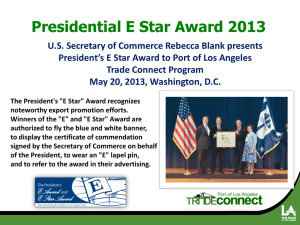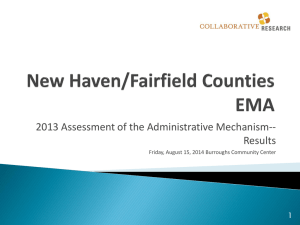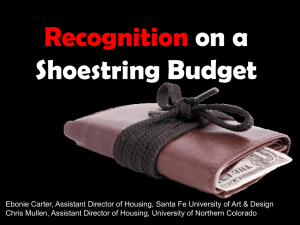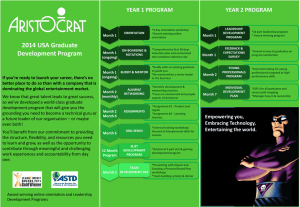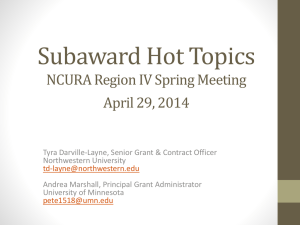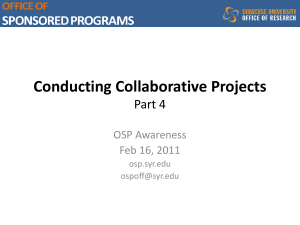Allowable/Unallowable Direct Costs
advertisement
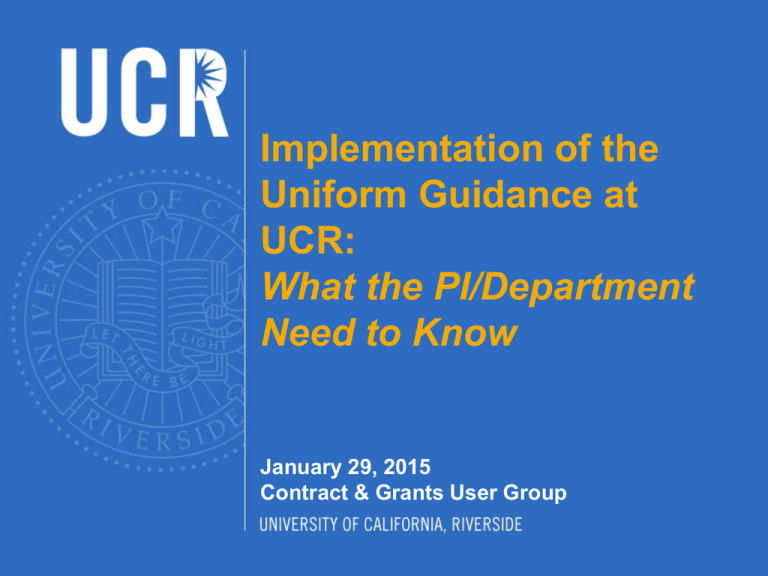
Implementation of the Uniform Guidance at UCR: What the PI/Department Need to Know January 29, 2015 Contract & Grants User Group Uniform Guidance (UG) Uniform Administrative Requirements, Cost Principles, and Audit Requirements for Federal Awards (aka Uniform Guidance) supersedes and streamlines the following eight existing OMB Circulars: • • • • • • • • A-21 Cost Principles for Educational Institutions A-87 Cost Principles for State, Local and Indian Tribal Governments A-122 Cost Principles for Non-Profit Organizations A-110 Uniform Administrative Requirements for Grants and Other Agreements with Institutions of Higher Education, Hospitals and Other NonProfit Organizations A-102 Grants and Cooperative Agreements With State and Local Governments A-133 Audits of States, Local Governments and Non-Profit Organizations A-50 Audit Follow-up A-89 Catalog of Federal Domestic Assistance This is a major reform of how the federal government provides assistance awards (e.g., grants and cooperative agreements) with the goal of increasing accountability and transparency while reducing the administrative burden on non-federal entities receiving federal awards. 2 Allowable/Unallowable Direct Costs UG defines direct costs as those costs that can be identified specifically with a particular final cost objective or sponsored agreement. Costs directly charged to federal awards must still be allowable, reasonable, necessary, and allocable; and the UG maintains that costs must be consistently treated and applied uniformly campus-wide. With the implementation of the UG, the treatment of certain costs as allowable direct charges to Federal awards has changed. The UG provides more flexibility for charging a number of cost items, but certain cost are now more restrictive. The following slides focus on the significant changes to the treatment of certain costs charged to Federal awards. 3 Allowable/Unallowable Direct Costs 1. Participant Support Costs (§ 200.456) Participant support costs are defined as direct costs for items such as stipends or subsistence allowances, travel allowances, and registration fees paid to or on behalf of participants or trainees, but not employees, in connection with conferences or training projects. Participant support costs are allowable with prior approval of the Federal awarding agency. Participant support costs are not routinely allowed on research projects, but can be charged if: (i) the project includes an education or outreach component, and (ii) the agency approves such costs in advance. Allowable/Unallowable Direct Costs 1. Participant Support Costs (cont.) Participant support costs should either be: (i) explicitly listed as a separate line item in the proposal budget or (ii) approved by the funding agency after the award is made, but prior to incurring such costs. Participant Support Costs were previously subject to F&A, but are now an excluded category. Therefore, these costs should NO LONGER be included in the indirect cost base when calculating F&A on proposal budgets. o UCR will be implementing a campus policy waiving the assessment of indirect cost on participant support costs. Such policy will remain in effect until participant support costs are listed as an excluded category on UCR’s F&A Rate Agreement. o A sample budget justification for participant support costs, and the waiver of overhead thereon, has been posted on the sponsor programs’ website at https://research.ucr.edu/spa/lifecycle/proposalpreparation-submission/preparing-proposal-budgets-budget-justifications.aspx Allowable/Unallowable Direct Costs 2. Computing Devices (§ 200.253) Computing devices costing less than $5,000/unit may be directly charged to the award provided all of the following conditions are met: a) The devices are essential, allocable, and necessary in the performance of the award to acquire, store, analyze, process, and publish data/information electronically; such devices include accessories or peripherals for printing, transmitting and receiving, or storing electronic information; b) The project does not have reasonable access to other devices or equipment that can achieve the same purpose; and c) Devices are not purchased for reasons of convenience or preference. Allowable/Unallowable Direct Costs 2. Computing Devices (cont.) The cost of computing devices that meet the above requirements may be charged 100% to an award or may be allocated to several awards. PIs are responsible for determining whether or not the device is “essential” and to what extent the cost of the device is allocable to the sponsored project. PIs and departments should maintain documentation that describes how the proposed computing device meets the above requirements. The devices should be itemized in the proposal budget and budget justification (or in the case of NIH modular grant applications, itemized in the detailed budget and budget justification provided to your sponsored programs officer). Allowable/Unallowable Direct Costs 3. Administrative & Clerical Salaries (§ 200.413(c)) Administrative and clerical salaries are still normally treated as indirect costs. However, the rules governing “major project or activity” exceptions have been replaced with the following criteria, all of which must be met: a) Administrative or clerical services are integral to the project or activity; b) Individuals involved can be specifically identified with the project or activity; c) Costs are explicitly included in the budget or have the prior written approval of the Federal awarding agency; and d) The costs are not included in the indirect cost rate. Note: The salaries of administrative & clerical costs are typically included in the indirect cost rate; therefore, this guidance relates to new positions, services and other costs not previously included in UCR’s negotiated F&A Rate Agreement. Allowable/Unallowable Direct Costs 3. Administrative & Clerical Salaries (cont.) If all of these requirements are met, PIs/departments should include a statement to the budget justification section of proposals to facilitate the required agency approval. The justification should: a) Explain how the administrative/clerical services are integral to the project and beyond the support typically provided within the PI’s dept./unit b) b) Identify the position’s effort of involvement (e.g., 10% effort for one budget year). The Federal awarding agency will determine if this explanation is persuasive. The PI will be required to certify as to the reasonableness of salaries, based on the work performed, in UCR’s Payroll Certification System. Allowable/Unallowable Direct Costs 4. Compensation — Standards for Documenting Personnel Expenses (§ 200.430) Effort Reporting examples removed. Greater emphasis on internal controls that provide reasonable assurance that the charges are accurate, allowable, and properly allocated. A explicit decision has not been made regarding payroll certifications, but some may argue the process meets the UG requirements. UCR will continue the FDP Pilot of the Payroll Certification process: Pilot extended through 12/31/15. UCR HHS OIG Audit report pending. Allowable/Unallowable Direct Costs 5. Publication & Printing (§ 200.461) Under the UG, the costs of publication or the sharing of research results which are incurred after the period of performance end date, but prior to the end of the 90-day closeout period, may be charged to the Federal award. Caveat: o At UCR, however, the window for incurring such costs after the period of performance end date is predicated on the costs posting to the ledgers within 30 days of the award expiration date to facilitate the timely submission of final financial reporting. Note: UG has become more explicit regarding the timeliness of award close-outs. o Please contact the Accounting Office to coordinate exceptions. Allowable/Unallowable Direct Costs 6. Visas (see Recruiting Costs under § 200.430(d)) The UG provides for consistent treatment of visa costs, across Federal funding agencies, as a “recruiting cost.” Prior to UG implementation, long-term visa costs which enabled individuals to obtain employment at UCR were allowable; such costs are no longer allowable long-term. The UG allows short-term, non-immigration visa costs for a specific period and purpose as direct costs on Federal awards if these costs are critical and necessary and clearly identified as directly connected to the work performed on the Federal award. Since this expense is being classified as a recruiting cost, only the initial visa cost is allowable. Allowable/Unallowable Direct Costs 6. Visas (see Recruiting Costs under § 200.430(d)) J1 and H1B visas are for a specific period and purpose; therefore, these visa types are generally allowable if the specific conditions are met. The PI/Dept. should maintain documentation substantiating how such visa costs are critical/necessary for the conduct of the project. Allowable/Unallowable Direct Costs 7. Travel Costs (§ 200.474) The UG now allows temporary dependent care costs above and beyond regular dependent care that directly results from travel to conferences, provided the costs: a) Are direct result of the individual’s travel to conferences for the Federal award; b) Are only temporary during the travel period; and c) Consistent with the non-Federal entity’s documented travel policy for all entity travel (i.e., as long as the cost are allowable under the institution’s policies). Temporary dependent care costs are new. UC policy has not yet been revised; therefore, these type of costs cannot be included in proposal budgets, and may not be charged to a Federal award until UCOP establishes a policy. Procurement Standards Contained in §§ 200.318 through 200.326 of the OMB Uniform Guidance Methods of Procurement: Micro-Purchases (<$3,000) Small Purchase ($3,000-$150,000) Sealed Bids ($150,000 or greater) Competitive Proposals ($150,000 or greater) Sole Source (>$3,000 where competition is to be restricted) Procurement: Micro-Purchases (<$3,000) The acquisition of supplies or services, the aggregate dollar amount of which does not exceed $3,000 To the extent practicable, must be distributed equitably among qualified suppliers May be awarded without soliciting competitive quotations if the non-Federal entity considers the price to be reasonable. UCR’s DAPO and ProCard limits of $2,500 comply with this threshold. Procurement: Small Purchase ($3,000$150,000) Procurement of services, supplies, or other property that does not cost more than the Simplified Acquisition Threshold ($150,000). Note: the UC bid limit of $100,000 applies. Quotations must be obtained from an “adequate” number of qualified sources. § 200.320 (c)(ii) defines “adequate” as two or more. Procurement: Sealed Bids ($150,000+) Publicly Solicited Fixed Price Two or more responsible bidders willing and able to compete Publicly Opened Awarded to responsive, responsible low bidder Note: the UC bid limit of $100,000 applies. Procurement: Competitive Proposals ($150K+) Must solicit from more than one source Fixed price or cost reimbursement type contract Used when conditions are not appropriate for the use of sealed bids. Must be publicized and identify all evaluation factors and their relative importance. Any response must be considered to the maximum extent practical Must have written method for conducting evaluation of proposals Must be awarded to the responsible firm whose proposal is most advantageous to the program Note: the UC bid limit of $100,000 applies. Procurement: Sole Source (>$3,000) May be used only when one or more of the following circumstances apply: (1) The item is available only from a single source; (2) The public exigency or emergency for the requirement will not permit a delay resulting from competitive solicitation; (3) The Federal awarding agency expressly authorizes noncompetitive proposals (4) After solicitation of a number of sources, competition is determined inadequate. Procurement Claw (Sections 200.317-200.326) 21 Procurement: Conflict of Interest (§200.112) The UG requires the written disclosure of any potential conflict of interest to the Federal awarding agency. The PI must report any potential business relationship with a contracting party. 22 Procurement: Effective Date Institutions are provided with the ability to utilize a one-year grace period for complying with the UG procurement standards beginning with the first full fiscal year that starts after the effective date of December 26, 2014 (i.e., July 1, 2015). UCR will take advantage of the grace period; therefore, implementation of the procurement standards is not required until July 1, 2015. Procurement: Documentation Under UG, the following thresholds trigger additional purchase documentation and requirements: $3,000.00 - $149,999.99 (inclusive of tax and shipping) Price reasonableness and the history of the purchase must be documented. Two or more quotes are required where competition exists for transactions between $3,000 & $150,000 >$149,999.99 (inclusive of tax and shipping) This threshold requires a competitive environment, which will take care of the documentation for purchase history, cost analysis and price reasonableness. Competitive Bids or Proposals required from at least two sources. Procurement Sole Source justification will be required when competition is restricted for ANY transaction exceeding $2,999.99 using federal and federal flow through funds. In general, the most restrictive procurement requirements will prevail; therefore, the procurement limits will at times be governed by UG, UC Business & Finance Bulletin BUS-43-Material Management, or UCR Policy & Procedure. For example: 1) 2) UC BFB BUS-43 allows for competitive negotiation with one or more vendors on orders up to $100,000, but since the UG threshold is $3,000, the UG threshold will apply when using federal and federal flow through funds. This means quotations from two or more vendors or a sole source justification are required for orders exceeding $3,000 UG’s competitive threshold is $150,000, but since UC BFB BUS-43 and CA Public contract code’s competitive bid threshold is $100,000, the UC and CA threshold apply. Formal competition or a sole source justification are required for orders exceeding $100,000 Please involve Purchasing as soon as possible. Equipment As previously discussed, the UG introduces differing standards for the allowability of computing equipment as direct costs. If the possibility exists that equipment needs to be shipped back to the government or another agency, funds should be reserved in the award for such costs incurred prior to closeout. UC is seeking clarification regarding ambiguity in various sections concerning whether equipment disposal costs are allowable as direct charges. Equipment In general, there is no change from the current policy. General-purpose equipment is unallowable as a direct cost, except with the prior written approval of the Federal awarding agency or pass-through entity. Federally funded equipment with a market value exceeding $5,000 that is sold by UCR must remit sale proceeds to the government proportional to the Federal agency’s participation in the equipment’s acquisition. Subawards Fixed-Price Awards (§ 200.201) UG now requires a certification at the end of a fixed-price subaward. The subrecipient must certify in writing to the passthrough entity that the project/activity was completed. If the required activity was not completed, the amount of the subaward must be adjusted. This requirement applies when UCR is the recipient of a fixed-priced award as well as when UCR issues a fixed-price subaward to a subrecipient. Fixed-priced subawards needs to be articulated in the proposal budget and/or justification. If approval is not obtained during the proposal stage, approval must be obtained from the Federal awarding agency in advance of issuing the subaward, which may delay the issuance of the subaward. A fixed-price subaward cannot be issued if cost sharing is mandatory under the award issued to UCR. Subawards: Required Information (§ 200.330) UG now requires advanced subrecipient/contractor determinations. For subawards issued by UCR, Sponsored Programs Administration (SPA) will communicate the criteria for making such determinations to the PI via information and a checklist posted on SPA’s website. The subrecipient/contractor determination must be documented in each case. Subawards cannot terminated without first providing a notice of termination. Additionally, if the termination was due to the non-Federal entity's non-compliance, the notification must state that the termination may affect future applications. (§ 200.340) UG contains new reporting requirements regarding a PI’s poor programmatic performance and failure to comply with Federal law or the terms and conditions of the award. This information will be disseminated to other Federal agencies and may affect the outcome of future proposals. PIs are now required to carefully monitor and accurately report the performance of their subrecipients. PIs must report poor performance of their subrecipients via the Federal website available to the general public. Subawards Subrecipient Monitoring Ensure PIs understand their award could be at risk if they sign an invoice authorizing payment of funds to a subrecipient without first thoughtfully evaluating the subrecipient’s progress. Inform PIs that if the university issues a management decision to a subrecipient as a result of an audit, monitoring by the university must include review of financial and programmatic reports submitted to UCR. (§ 200.305) UG requires payment of subrecipient invoices, associated with cost reimbursable subawards, to be paid within 30 days of receipt of invoice UNLESS the pass-through entity reasonably believes the request to be improper. Therefore, Prompt review and approval of subrecipient invoices by the PI is essential. Concerns regarding performance must be immediately reported to SPA. All invoices should be submitted directly to the Accounting Office by subrecipients. Facilities and Administrative Costs It is generally inappropriate to reduce F&A costs on federally funded awards. Reducing or limiting an entity’s Federally negotiated rate is seen as a form of cost sharing (whether mandatory or voluntary) and is not permitted under the UG. Therefore, under the UG, an entity’s Federally negotiated F&A rate is required to be accepted by all Federal sponsors. Facilities and Administrative Costs UCR proposals must utilize our applicable F&A rate. The federal sponsor’s representative can no longer require or request the PI use a rate different from UCR’s Federally negotiated rate unless: A different rate is required by Federal statute/regulation, or The different rate being utilized is approved by the Federal sponsor’s head/delegate and the justification for the different rate is made public. If a Federal program has a published statutory F&A cap, as described above, that is less than UCR’s Federally negotiated rate, then that F&A cap must be used both by UC and each of its subrecipients who also have Federally negotiated rates greater than the F&A cap imposed. Facilities and Administrative Costs If the PI is proposing subawards in his/her budget, the subrecipients’ Federally negotiated F&A rate must be used and a copy of the F&A rate agreement should be obtained for confirmation of rate. If a subrecipient does not have a Federally negotiated F&A rate, a 10% (MTDC) de minimus F&A rate must be used (or UC may negotiate an F&A rate with the subrecipient; however, UC is still evaluating this option and will implement policies in the near future). There is no change to UCR’s recovery of its Federally negotiated F&A rate in instances where UC is a subrecipient. 33 Facilities and Administrative Costs The exclusion of assessing F&A on approved participant support costs are now included in the definition of Modified Total Direct Costs (MTDC). When PIs are requesting allowable and appropriate participant support costs on Federal budgets, the participant support costs should be excluded from the F&A calculation. Participant support costs should also be detailed as an exclusion, as appropriate, in the section of the budget justification addressing the assessment of F&A costs. 34 Prior Approvals This section provides a list of circumstances that require prior written approval of the Federal entity (awarding agency or cognizant agency) before such action can be taken by the campus. Many of these prior approval requirements outlined in § 200.407 of the UG are not new and have not changed from previous circulars; however, the mechanism of obtaining prior approval from the sponsor may have changed. The list below focuses on those requirements that are new or have changed. Prior Approvals Cost Sharing or Matching Voluntary committed cost sharing is NOT expected on any Federal proposal. Note: Voluntary committed cost sharing cannot be used by the Federal awarding agency as a factor during the merit review of applications or proposals, but may be considered if the application/proposal is both: a) in accordance with Federal awarding agency regulations and b) specified in a notice of funding opportunity (e.g., solicitation or RFP). Criteria for considering voluntary committed cost sharing, and any other program policy factors that may be used to determine who may receive a Federal award, must be explicitly described in the notice of funding opportunity. If the application/proposal (i) requires mandatory cost-sharing and (ii) limits recovery of indirect costs to less than the full Federally-negotiated F&A rate, then use of the unrecovered indirect costs to offset the costsharing component in the application/proposal REQUIRES prior approval of the Federal awarding agency. If such unrecovered indirect costs are included in application/proposal budget, it must be specifically requested via the budget justification. Prior Approvals Program Income* If a project generates program income and the PI wishes to use it (to carry out the purpose of the award), prior approval must be secured. *Program income is gross income earned by an awardee that is directly generated by a Federally supported activity or earned as a result of a Federal award. Program income may be earned in research, education, or conference awards. Program income includes but is not limited to income from: (1) Registration fees for conferences supported by conference awards; (2) Fees for services performed; (3) The use or rental of real or personal property acquired under the award; (4) The sale of commodities or items produced using award funds; (5) License fees and royalties on patents and copyrights; or (6) Interest on loans made with award funds. Program income does not include income from: (1) Interest earned on advances of Federal funds; (2) The receipt of principal on loans; or (3) Rebates, credits, or other discounts. Prior Approvals Revision of Budget and Program Plans PIs can now be absent from the project location and remain “engaged” in research activities without being required to obtain prior approval and/or a temporary replacement PI (e.g. engaged via web based communication programs and electronic devices). Any “disengagement” exceeding 3 months requires prior approval from the Federal agency. A reduction in PI’s effort of 25% or more still requires prior approval. Rebudgeting of funds earmarked for participant support costs requires prior approval. Prior approval is required for re-budgeting cost share. Specifically, cost share must be delivered for the purpose for which it was promised. Prior Approvals Fixed-Price Subawards As previously discussed, agency prior approval is now required to enter into a fixed-price subaward (versus a costreimbursement subaward). To expedite agency approval and subsequent issuance of the subaward, add a new justification statement to proposals containing a fixed-price subaward. The total value of each fixed-price subaward may not exceed $150,000. This limit should be considered in advance of issuing the initial fixed-price subaward as it relates to multiyear projects. Subawards may need to be terminated when the $150,000 threshold is reached and a new subaward initiated, which would require assessing F&A on the first $25,000 again. Prior Approvals Fixed-Price Subawards (cont.) It is acceptable to have more than one fixed-price subaward with the same subrecipient if necessary to complete work contemplated under a Federal award. It is expected, however, that each fixedprice subaward will have its own distinct statement of work and be priced for the work and deliverables that will be due under that subaward, and that prior approval of the Federal awarding agency is required for each subaward issued. Non-federal entities having special circumstances, including an unanticipated need to increase a fixed-price subaward above the $150,000 threshold, should consult with their Federal awarding agency for guidance on how to complete the planned scope of work with the least amount of administrative burden. (Note: This is not a mechanism for using a fixed-price subaward when it is known in advance that there is a great likelihood of exceeding the $150,000 threshold.) Prior Approvals Administrative and Clerical Costs As previously discussed, administrative and clerical costs are normally treated as indirect costs. Exceptions must meet all of the following conditions: Administrative or clerical services are integral to the project; Individuals involved can be specifically identified with the project or activity; Costs are explicitly included in the budget or have the prior written approval of the Federal awarding agency; and The costs are not included in UCR’s indirect cost rate agreement. Note: The salaries of administrative & clerical costs are typically included in the indirect costs; therefore, this relates to new positions, services and other costs not previously included in UCR’s negotiated F&A rate agreement. Prior Approvals Compensation —Personal Services (§200.430) Incidental activities for which supplemental compensation is allowable under written institutional policy, at a rate not to exceed institutional base salary (IBS), must either be specifically provided for in the federal award budget or receive prior written approval by the Federal awarding agency. Charging a faculty member's salary to a Federal award must not exceed the proportionate share of the IBS for the period during which the faculty member worked on the award unless there is prior approval by the awarding agency Prior Approvals Compensation —Personal Services (§200.430) Excerpt from UG: (h) Institutions of higher education (IHEs). (1) Certain conditions require special consideration and possible limitations in determining allowable personnel compensation costs under Federal awards. Among such conditions are the following: (i) Allowable activities. Charges to Federal awards may include reasonable amounts for activities contributing and directly related to work under an agreement, such as delivering special lectures about specific aspects of the ongoing activity, writing reports and articles, developing and maintaining protocols (human, animals, etc.), managing substances/chemicals, managing and securing project-specific data, coordinating research subjects, participating in appropriate seminars, consulting with colleagues and graduate students, and attending meetings and conferences. (ii) Incidental activities. Incidental activities for which supplemental compensation is allowable under written institutional policy (at a rate not to exceed institutional base salary) need not be included in the records described in paragraph (i) of this section to directly charge payments of incidental activities, such activities must either be specifically provided for in the Federal award budget or receive prior written approval by the Federal awarding agency. (2) Salary basis. Charges for work performed on Federal awards by faculty members during the academic year are allowable at the IBS rate. Except as noted in paragraph (h)(1)(ii) of this section, in no event will charges to Federal awards, irrespective of the basis of computation, exceed the proportionate share of the IBS for that period. This principle applies to all members of faculty at an institution. IBS is defined as the annual compensation paid by an IHE for an individual's appointment, whether that individual's time is spent on research, instruction, administration, or other activities. IBS excludes any income that an individual earns outside of duties performed for the IHE. Unless there is prior approval by the Federal awarding agency, charges of a faculty member's salary to a Federal award must not exceed the proportionate share of the IBS for the period during which the faculty member worked on the award. Prior Approvals Entertainment Costs Costs of entertainment, including amusement, diversion, and social activities and any associated costs are unallowable, except where specific costs that might otherwise be considered entertainment have a programmatic purpose and are authorized either in the approved budget for the Federal award or with prior written approval of the Federal awarding agency. Exchange Rates PIs/departmental administrators, should notify the Office of Sponsored Programs ASAP if they feel their project qualifies for additional funding as a result of fluctuation in exchange rates (e.g., foreign subawards). Memberships, Subscriptions & Professional Activity Costs Costs of membership in any civic or community organization are allowable with prior approval by the federal awarding agency or pass-through entity. Participant Support Costs Inclusion of this direct cost requires prior approval. For expediency, in the approval process, include and fully justify in proposal applications when necessary to carry out the project. Prior Approvals Pre-award Costs Now requires “written” approval. Such costs are allowable only to the extent that they would have been allowable if incurred after the date of the Federal award and only with the written approval of the Federal awarding agency. Until the revised FDP Prior Approval Matrix becomes available, or the specific Federal agency has provided the written agency specific pre-award guidelines, individual written approval must be obtained from the awarding agency prior to authorizing/incurring pre-award expenditures. Travel Costs Dependent care travel costs (newly allowable under UG) cannot be included in proposal budgets, and may not be charged to a Federal award until UCOP establishes a policy. Other Many prior approval requirements have not changed with the implementation of the UG; please refer to the UG. Internal Controls “Internal Controls” is one of the most frequently repeated phrases in the UG. In the previous circulars, internal controls were mainly cited as an audit requirement in A-133, often considered by entities only after the funds had been spent. In the UG, OMB clearly emphasizes the importance of Internal Controls by defining them, clearly identifying source documentation for best practices and including internal controls in the post-award management standard requirements. Note: acceptable audits in previous years should not be relied upon as an indication that current internal controls are sufficient under the UG. Internal Controls What are Internal Controls? Internal controls are processes designed to provide reasonable, but not absolute, assurance regarding the achievement of objectives in the following categories: Effectiveness and efficiency of operations Reliability of financial reporting Compliance with applicable laws and regulations Internal Controls Effective internal controls help mitigate risks of waste, fraud and abuse. The consequences of noncompliance, as stated in § 200.338, may include withholding funds, cost disallowances, suspension or termination of the award, and could affect future funding to the campus. PIs and departments should familiarize themselves with UC and UCR policy as well as internal control best practices and modify procedures as necessary. One size does not fit all. If a control cannot be documented in an audit, it does not exist. Internal Controls UG contains a new explicit personally identifiable information (II) requirement. "Personally identifiable information" (PII), as used in U.S. privacy law and information security, is information: That can be used on its own or with other information to identify, contact or locate a single person, or to identify an individual in context. About an individual maintained by an agency, including (1) any information that can be used to distinguish or trace an individual‘s identity, such as name, social security number, date and place of birth, mother‘s maiden name or biometric records; and (2) any other information that is linked or linkable to an individual, such as medical, educational, financial and employment information. Financial Management and Reporting The UG contains significant changes regarding financial management and reporting. The PIs and departments should expect changes in the campus guidelines and system configuration to properly account, record and report award activities. Final financial reports, technical reports and other required reporting must be submitted on time. PIs need to closely monitor expenditures especially toward the end of the award performance period. PI must work closely with departmental administrators to review the award expenditures and make the necessary corrections/adjustments in a timely manner. Financial Management and Reporting Sponsors may (and have recently) question and/or deny expenditures and related drawdowns submitted after the permitted closeout period. There will be new campus policies and guidelines that may change the way award closeouts are managed. Financial reporting certifications will be legally binding; therefore, additional certifications by the PI and/or department may be necessary. Best Practice will be for: PI to perform monthly certifications in the PIWRS. PIWRS Coordinators to enter projections. Payroll Certifications should continue to be performed timely. Financial Management and Reporting When program income is involved, departments should ensure program income is properly recorded and the related expenditures are compliant with award restrictions and the approved budget. PIs and departments should be aware of the potential adverse impact of buying items in bulk or purchasing supplies and equipment toward the end of an award. Inform PI there is increased importance of timely progress reporting, including the reporting of both significant positive and negative impacts on projects. UG contains stricter rules for award closeout. Next Steps Award issued since 12/26/2014 are subject to the new UG guidance, except the procurement requirements that will go into effect on 7/1/2015 Federal sponsors are still disseminating their implementation guidelines Town Halls will be conducted for PIs in the coming months; look for announcements New tools are being developed to assist departments with the pre-approval and budget justification process as well as proposal certifications. As tools are developed, information and/or training will be deployed. 53 Questions? Send questions and comments to ug@ucr.edu UCR UG Workgroup Linda Casteel, Accounting, Treasury Manager Fred de Vera, Accounting, Fund Manager David Gee, Purchasing, Campus Purchasing Manager Charles Greer, AVC-Research Tim LeFort, Sponsored Programs Administration, Pr. Sponsored Programs Officer Russ Lewis, Materiel Management, Director Caron Miller, Sponsored Programs Administration, Assistant Director Bobbi McCracken, AVC-Financial Services Pauline Librenjak, Accounting, Assistant Controller Steve Staples, Equipment Management, Equipment Manager Cynthia Wells, Sponsored Programs Administration, Director 55 Resources/References Uniform Guidance: http://www.ecfr.gov/cgi-bin/text-idx?node=2:1.1.2.2.1 UC Uniform Guidance Resource Website: http://www.ucop.edu/research-policy-analysis-coordination/research-sponsorsagreements/federal-government/uniform-guidance/index.html Agency implementation guidance: NSF 15-1 Dec. 26, 2014 PAPPG: http://www.nsf.gov/pubs/policydocs/pappguide/nsf15001/aag_5.jsp#VA2b Procurement UC Procurement Policy: http://policy.ucop.edu/doc/3220485/BFB%20BUS-43 56 Resources/References Conflict of Interest UC Research Policy http://www.ucop.edu/research-policy-analysis-coordination/policiesguidance/conflict-of-interest/index.html UCR Procurement http://purchasing.ucr.edu/purchasing/policy.html#conflict UC OGC http://www.ucop.edu/general-counsel/legal-resources/conflict-of-interest-code.html State Law http://www.leginfo.ca.gov/cgi-bin/displaycode?section=gov&group=8000181000&file=81000-81016 57 Resources/References Internal Controls: http://www.ucop.edu/ucophome/businit/boi/docs/03understanding_internal_control.pdf http://www.coso.org/IC.htm http://www.gpo.gov/fdsys/pkg/CFR-2014-title2-vol1/pdf/CFR-2014-title2-vol1-sec20062.pdf http://www.gao.gov/products/GAO-14-704G UCR’s Privacy Policy: http://www.ucr.edu/privacy.html BFB-BUS-79: Expenditures for Business Meetings, Entertainment, and Other Occasions: http://policy.ucop.edu/doc/3420364/BFB-BUS-79 BFB-G-43: University Membership in Organizations http://policy.ucop.edu/doc/3420355/BFB-G-43 58
